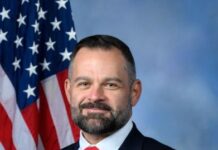On Monday, U.S. Senator Marsha Blackburn (R-Tenn) introduced a package of bills known as the “DOGE Acts” to hold the federal government accountable for managing taxpayer dollars. The DOGE Acts coincide with President Trump’s Department of Government Efficiency (DOGE) to modernize federal technology and maximize government productivity.
“Under President Trump’s leadership, Republicans have the opportunity to slash wasteful spending and rein in outsized bureaucracy,” said Senator Blackburn. “The DOGE Acts would get the federal government back on track by requiring federal employees to return to the office, move federal agencies into the heartland of America, cut bloated federal spending, lower taxes on social security for seniors, and freeze federal hiring and salaries until we can rightsize the federal government.”
THE DOGE ACTS:
The DOGE Acts include the separate pieces of legislation below:
- The Federal Freeze Act would direct certain agency heads to implement a one-year freeze on hiring and salary increases and decrease the size of the agency’s workforce by 2% two years after enactment and 5% three years after enactment. The bill would exempt employees deemed necessary for national security, law enforcement, public safety, and public health purposes from the hiring freeze. Click here for bill text.
- The Commission to Relocate the Federal Bureaucracy Act would establish a commission to report to Congress on moving non-national security related agencies out of the Washington D.C. metropolitan area based on a variety of factors, including financial efficiency, the existence of pre-existing infrastructure, whether an area is designated as a Qualified Opportunity Zone or as economically distressed, and whether at least 50% of an agency’s workforce participated in telework in the last five years. The bill would also instruct the commission to develop the report with an aim of relocating at least 100,000 federal employees out of the D.C. metro area. Click here for bill text. This legislation is co-sponsored by Senators Bill Cassidy (R-La.), Thom Tillis (R-N.C.), and Pete Ricketts (R-Neb.).
- The Federal Employee Performance and Accountability Act would implement a 5-year pilot program establishing a performance-based pay structure among certain federal employees in order to bolster government efficiency, exempting agencies deemed necessary for national security or public safety. Click here for bill text. This legislation is co-sponsored by Senators Thom Tillis (R-N.C.) and Pete Ricketts (R-Neb.).
- The Stopping Home Office Work’s Unproductive Problems (SHOW UP) Act would require government agencies to reinstate their pre-COVID telework policies within 30 days and direct agency heads to submit to Congress a report on the adverse impacts of agencies’ expansion of telework policies for employees during COVID. Further, it would prevent federal agencies from permanently expanding telework without submitting to Congress details on how remote work policies will bolster agency mission performance. Click here for bill text. This legislation is co-sponsored by Senators Mike Crapo (R-Idaho), Joni Ernst (R-Iowa), Bill Cassidy (R-La.), Thom Tillis (R-N.C.), Pete Ricketts (R-Neb.), and Chuck Grassley (R-Iowa).
- The Reducing Excessive Taxation and Inefficiencies by Reforming Elder Exemptions to Support Fairness, Inflation Relief, and Simpler Taxes (RETIREES FIRST) Act would lower the tax burden on Social Security benefits for seniors and offset this tax relief by redirecting funds from inefficient non-security discretionary programs, safeguarding the Social Security and Medicare trust funds while prioritizing retirees. Click here for bill text. This legislation is co-sponsored by Senator Roger Marshall (R-Kan.).
- 1%, 2%, and 5% Across-the-Board Spending Cuts: This legislation would implement across-the-board rescissions of non-security discretionary spending, including a rescission of 1% of non-security discretionary appropriations made available for Fiscal Year 2026, a rescission of 2% of non-security discretionary appropriations made available for Fiscal Year 2027, and a recission of 5% of non-security discretionary appropriations made available for Fiscal Year 2028 and every fiscal year thereafter. These cuts would exclude the Department of Defense, Department of Homeland Security, Department of Veterans Affairs, and National Nuclear Security Administration. Click here for bill text.















